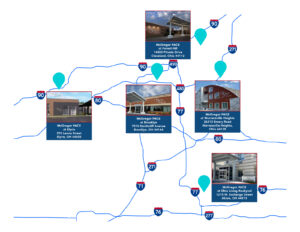
Making the Decision to Move a Loved One to a Skilled Care Facility
How to Know When a Loved One Would Benefit From a Nursing Home
The decision to move a loved one into a nursing home is often wracked with emotions—anxiety, grief, relief, and, most commonly, guilt. You may worry that you are failing your loved one by not caring for them personally in your home, or helping them remain in their own home. You might fear that removing your loved one from their environment and into a nursing home might worsen their health and lead to unhappiness or depression. The situation might also involve letting go of a beloved family home, which can be highly emotional.
When it comes to knowing when it is time to move a loved one into a nursing home, you must first consider not only your loved one’s current condition and well-being, but your own as a caregiver. Consider these questions:
- Are you dealing with constant fatigue?
- Do you feel both physically and mentally drained?
- Is your own health declining?
- Are you neglecting other family and work responsibilities to care for your loved one?
Now, think about your loved one. Are any of the following true?
- They have wandered and gotten lost.
- They say they are eating regularly but the fridge is usually bare or filled with expired items.
- They are neglecting their personal hygiene (e.g., bathing, grooming, and doing laundry).
- They are forgetting to take their medication.
- They are expressing feelings of isolation and loneliness.
- They are falling behind on bills.
- They have mobility challenges.
Many of the items above have to do with the Activities of Daily Living (ADL), which “collectively describe fundamental skills required to independently care for oneself, such as eating, bathing, and mobility.” ADL, which originated from physician Sidney Katz in 1950, is now one of the most common tools used to determine a person’s ability to function independently. If your loved one is having trouble with any of the normal activities needed to get through the day safely, they may benefit from nursing home care.
Basic Activities of Daily Living
- Ambulating (moving around independently)
- Feeding
- Dressing
- Personal hygiene (bathing, grooming, dental, nail, and hair care)
- Continence (controlling bladder and bowels)
- Toileting
Instrumental Activities of Daily Living
- Transportation and shopping
- Managing finances
- Shopping and meal preparation
- House cleaning and home maintenance
- Managing communication with others
- Managing medications
Source: Activities of Daily Living
The Benefits of a Nursing Home
Can a Skilled Care Facility Better Serve Your Loved One’s Needs?
As you consider a nursing home for your loved one, you must be honest with yourself: Does your loved one need special services and care beyond what you can reasonably provide? Many nursing homes are able to provide 24-hour skilled medical care and supervision. They are staffed with doctors, nurses, physical therapists, and other professionals who know how to help and care for your loved one and will advocate for their health and well-being at all times.
Don’t wait until you are panicked and pressured to choose a nursing home for your loved one. If you wait for an illness or an injury to place your loved one in the hospital, you will need to make a quick decision. The alternative is taking your time to explore your options now and make a choice based on which facility can best meet the needs of you and your loved one.
If you live in the Cleveland area, we invite you to discover the multiple living options available at McGregor, where we provide a continuum of care for seniors on our 45-acre estate. If you have questions about where to begin to determine the level of care your senior needs, please reach out to our team.


